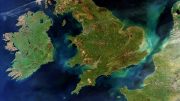Can the United Kingdom as currently constituted survive Brexit? Probably not, suggests Murray Ritchie.
Later this month Britain’s House of Lords will debate the future constitutional stability, or lack of it, of the United Kingdom after Brexit. Their Lordships will discuss whether and how the UK might resolve its present political and constitutional chaos amicably enough to let England, Scotland, Wales and Northern Ireland stick together in what prime minister Theresa May repeatedly calls “our precious union”.
The very fact that such a debate is deemed necessary is sufficient to suggest the UK might conceivably fall apart in the next few years because of Brexit and Mrs May knows it.
For those who believe Brexit is potentially a national disaster there is an almost poetic justice in the possible collapse of the UK constitution. Perhaps Yeats saw it coming 100 years ago this year when he wrote: “Things fall apart, the centre cannot hold”.
Bluntly put, the chances of a happy and consensual Brexit outcome for British politics are nil.
The Scots are dallying with independence again after being told their clear preference for Remain doesn’t matter. The Northern Irish are beginning to ponder Irish reunification as an alternative to renewed violence if the border is restored, and the Welsh are demanding a much bigger say in how the post-Brexit UK, or what’s left of it, reshapes itself and its over-centralised decision-making when the dust settles.
All this because the English, with 84 per cent of the UK population, (10 times that of Scotland) are split down the middle on Brexit. What England wants at such times, the United Kingdom always gets, because of the sheer weight of English electoral numbers.
It is an old song familiar to the outcome of many general elections over the years, but this time the crisis is different. Referendums are not as frequent as elections and if there were to be, exceptionally, a second Brexit referendum it would probably show the English still hopelessly split.
The UK would then fall out with itself all over again. All this, remember, because of an internal feud in the mainly English section of the Conservative Party.
With the victorious 52 per cent airily dismissing the defiant 48 per cent as mere bad losers and telling them simply to deal with it there can be no peace.
This is one political challenge with no perceptible chance of an agreed all-British resolution. What would happen if a second vote resulted in a 52-48 decision to Remain? There would be hell to pay. But that does not mean it won’t happen.
What then? A best-out-of-three referendum? It sounds ridiculous. Because it is. Instead, the most likely outcome is that parts of the UK go their own constitutional way.
As things stand the UK will leave the European Union with or without a deal at the end of March unless Article 50 is extended to provide a breathing space. But that would solve little.
With the victorious 52 per cent airily dismissing the defiant 48 per cent as mere bad losers and telling them simply to deal with it there can be no peace.
A bitterly divided UK is in no mood to accept such a crude winner-takes-all outcome. Such an unprecedented passion from Remainers cannot simply be swept aside and forgotten without consequences, no matter what hard-line Eurosceptics say. The divisions are simply too heartfelt.
Only some grudging compromise would offer hope but of that there is little sign especially if Mrs May’s much derided proposed deal is voted down in the Commons.
Whether the Conservative Party can survive its reckless self-indulgence must also be in grave doubt. Only a very brave or foolish punter would bet on this government surviving its tsunami of ministerial resignations, lost votes in the Commons, its contempt of Parliament conviction, furious backbench rebellions and poisonous internal feuding.
Bluntly put, the chances of a happy and consensual Brexit outcome for British politics are nil … the most likely outcome is that parts of the UK go their own constitutional way.
Theresa May seems oblivious to how the EU has actually helped keep the UK united. The Lords EU committee reported last year how, against a backdrop of devolution across the UK since the late 1990s, the EU had in effect been “part of the glue holding the United Kingdom together”.
The Irish, who have benefited hugely from the EU, are the most immediate problem because of a conundrum in Northern Irish politics. The people of Northern Ireland voted to remain in the EU but in the absence of a devolved government to speak for them they are represented in Westminster by the DUP who support Brexit.
All sides might want the open border retained between the Irish republic and the north, but the danger remains that a no-deal Brexit could encourage an unthinkable resumption of violence. Yet a peaceful political reunion with Dublin is anathema to the DUP.
In Scotland the accepted wisdom was that being “dragged out of the EU against our will” – in first minister Nicola Sturgeon’s well-worn phrase – would boost demand for a second independence referendum.
The polls tell a different story. They have moved only very slightly in Ms Sturgeon’s direction, although a bad Brexit might yet help her cause. There is a growing assumption that indyref2 is coming. When, is now the only question.
As for the Welsh who voted narrowly Leave they are still smarting, like the Scots, from the “naked power grab” – the words of former first minister Carwyn Jones – whereby Westminster moved to intercept powers in devolved areas being returned by the EU to the UK.
This has led to Welsh determination to become bigger players when a new arrangement is reached between central and devolved governments.
It all adds up to an unholy mess and it could yet get much worse. David Cameron, the former prime minister, who started all this by calling the EU referendum, must reflect in his quieter moments if he made the biggest mistake in modern British political history.
How ironic that the party sworn to uphold the British Union looks like being its nemesis.

Featured Image Credit: Gina Power/Shutterstock.com




